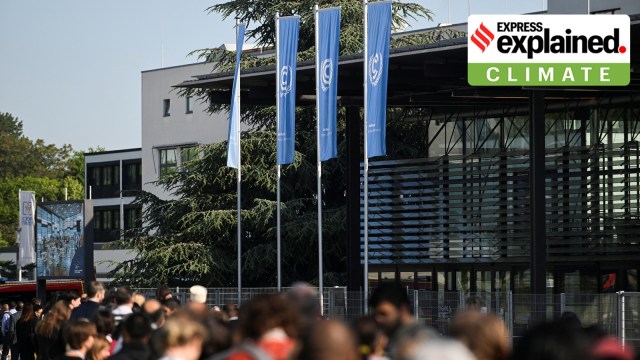Bonn Climate Change Conference begins: Everything you need to know
The Bonn Climate Change Conference is an annual mid-year meeting that takes place under the United Nations Framework Convention on Climate Change (UNFCCC) — an international agreement, signed in 1992, that has provided a basis for climate negotiations.
 The conference usually takes place in June every year. (Reuters)
The conference usually takes place in June every year. (Reuters)The annual Bonn Climate Change Conference began on Monday (June 16) as more than 5,000 government delegates and stakeholders gathered in Bonn, Germany. The meeting, which will wrap up on June 26, will witness discussion on a wide range of issues, including the mobilisation of finance to tackle climate change.
What is the Bonn Climate Change Conference?
The Bonn Climate Change Conference is an annual mid-year meeting that takes place under the United Nations Framework Convention on Climate Change (UNFCCC) — an international agreement, signed in 1992, that has provided a basis for climate negotiations. The conference is formally known as the Sessions of the UNFCCC Subsidiary Bodies (SBs). Along with the annual Conference of the Parties (COP), it is the only other regular climate summit hosted by the UNFCCC.
It is attended by the members of SBs — essentially committees that assist UNFCCC’s governing bodies in implementing and reviewing climate change agreements. The meeting is also attended by Indigenous representatives, international organisations, scientists, and civil society representatives.
The objectives
The conference takes place to discuss technical and scientific aspects of climate negotiations, and set the agenda for COP, which usually takes place in November.
“The results of the negotiations in Bonn are highly influential on decisions made at the COP. Recommendations made at the SBs frequently appear in final decisions acted upon by parties at the COP,” according to a report on the website of Harvard Kennedy School.
The Bonn Climate Conference is also the venue where the implementation of agreements set at the previous COP is discussed.
The key players
The meeting is led by the SBs of the UNFCCC. There are two permanent SBs of the UNFCCC, the Subsidiary Body for Implementation (SBI) and the Subsidiary Body for Scientific and Technological Advice (SBSTA).
SBI assists UNFCCC governing bodies in the assessment and review of the implementation of their decisions. It also facilitates discussions on financial and technical support to developing countries which are party to the UNFCCC.
SBSTA advises governing bodies on scientific knowledge related to climate change. “It serves as the “link” between scientific advisors at the IPCC and policymakers serving in party delegations at the COPs,” the Harvard Kennedy School’s report said.
This year’s agenda
One of the key topics during discussions will be the Global Goal on Adaptation (GGA), which is an attempt to identify a common global goal on adaptation, just like keeping temperatures below the 1.5 degrees Celsius threshold is a global goal on mitigation.
Although GGA was established in the Paris Agreement in 2015, no major breakthrough came till COP28 in Dubai, where parties adopted a framework for defining global goals on adaptation.



- 01
- 02



































